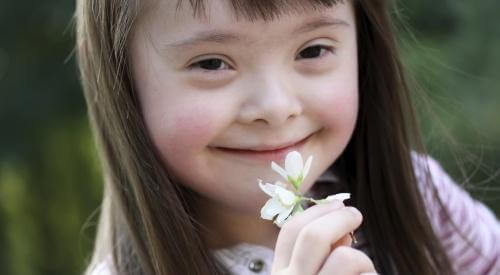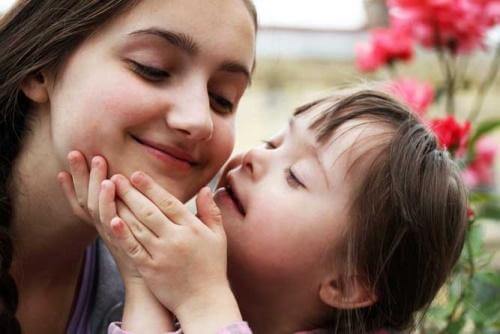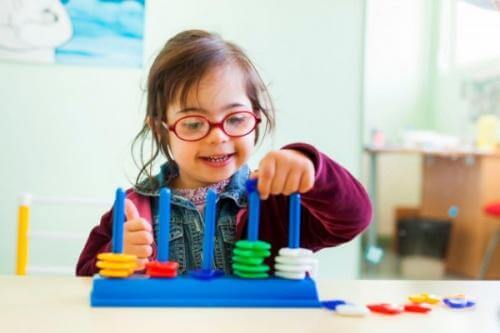Raising a Child with Down Syndrome

Children with Down syndrome have the same needs and should be treated like any other child.
As will all children, good communication is essential when it comes to raising children with this condition. In addition, their parents should also keep a close watch on their health and nutrition and support them in every way.
If you have a child with Down Syndrome, you should ensure that they do activities to develop their skills and their talents.
What is Down Syndrome?
Down syndrome is a genetic alteration caused by the presence of all or part of a third copy of chromosome 21. The anomaly occurs 1 of every 1,000 births and is considered to be one of the most common genetic alterations worldwide.
The causes of Down syndrome aren’t clear. Some cases of children with Down syndrome are hereditary, while others are associated with the mother’s age. Beyond that, there is no other known specific cause of this syndrome.

Physically, children with Down syndrome share certain characteristics, including almond-shaped eyes, large mouths and lips, and small ears. However, these children may have completely different personalities. Their way of learning and sense of humor can also vary.
What is certain is that these children are very emotionally intelligent and like to express affection.
Take a look at this article: Raise Healthy Kids: Don’t Vent Frustrations on Children
How to Raise Children with Down Syndrome
Being parents of children with Down syndrome can be quite an adventure. It can also be a bit unsettling due to the lack of information regarding this topic.
Don’t be concerned if your child has this condition. You can raise your child just like any other, as long as you show them a lot of affection and support.
There are many tips on how to treat children with Down syndrome. First of all, you should understand that they’re completely normal and, therefore, should be treated as such. To do so, you need to have the best attitude and show understanding.
You also need to show your child all the love you feel for them.
That said, let’s take a look at some tips for raising a child with Down Syndrome.
Communicate Well
Good parent communication is extremely important. You should pay more attention to the way you express yourself with a child with Down syndrome.
Children with this condition usually take longer to talk. Similarly, they may have language and communication problems. However, you shouldn’t despair. Try to be patient and find ways to communicate appropriately with your child.
Encourage Them to Interact with Siblings and Other Children

Children with this syndrome have developmental stages that manifest at different times. However, that doesn’t restrict interaction. Interacting with their siblings or other children will allow for full and satisfactory development.
You should also make sure they relate to adults, especially those in their environment. Encouraging a child with this condition to interact with others, share ideas, and communicate will make them feel good. At the same time, it’ll be a way for your inner circle to become familiar with the situation.
Determine Whether Children with Down Syndrome Go to a Public or Special Private School
A child with this syndrome can attend a public school. In fact, this is advisable, as it allows them to socially integrate with other children who share their condition, as well as those who don’t. This will boost their self-esteem and help them build relationships.
Regarding education, it’s likely that children with Down syndrome will learn at a different pace in comparison with other students. However, this could be addressed with the teacher’s help, as well as Mom and Dad’s help at home.
You should always keep in mind that children with this condition experience development stages in different ways.
Expose Them to a Variety of Activities

We all have a particular talent or skill. Children with Down Syndrome are no different, and can develop a special ability to excel in certain areas.
These children can do any activity effectively. It’s just a matter of encouraging them to do activities that allow them to explore all their abilities.
Let’s take a look at a few of them.
1. Arts
Painting, music, dancing, and other arts can help children with Down Syndrome develop their emotional intelligence.
If you have a child with this condition, it’s advisable to enroll them in activities such as dancing, singing, or acting. This will allow your child to think outside the box and learn new things at the same time.
2. Sports
Sports activities also benefit children with Down Syndrome. They help improve their physical condition, teamwork, and the achievement of goals.
Sports, especially those of short duration in which there are frequent breaks, are very beneficial. Some of the most recommended sports are:
- Swimming
- Soccer
- Rhythmic gymnastics
- Basketball
- Table tennis
- Martial arts
3. Games
Every child needs recreation and entertainment for their optimal development. In this regard, it’s important for children with Down Syndrome to enjoy playtime.
Through games, you’ll be able to teach them whatever you want. They’re also valuable tools that stimulate motivation.
Should I Pay Extra Attention to Their Diet?

Nutrition in children with Down syndrome is important. Children who have this disorder usually take longer to learn to drink breast milk or out of a bottle while they’re babies. Thus, you’ll need to be patient and offer the child greater incentives so they have an easier time adapting to new foods.
During childhood, it’s crucial for any child to eat a balanced diet that includes all food groups. However, children with this syndrome are prone to being heavy due to the fact that they’re typically shorter and that they tend to do less physical activity than other people.
The Health of Children with Down Syndrome
A significant percentage of children with Down syndrome may suffer from heart problems. It’s estimated that 45% of these children suffer from heart conditions. Similarly, children with Down syndrome tend to suffer from lung problems, which is why they’re prone to colds.
Other common health problems among children with Down Syndrome are hearing impairments and vision problems such as cataracts, myopia, or strabismus. They also may suffer from recurring stomach conditions because some babies are born with intestinal malformations.
Although they may suffer from many diseases, don’t worry, as they all are treatable. The most important thing is prevention. Thus, if you’re a parent of a child with Down Syndrome, you should keep a close watch on their health and regularly consult your doctor.
Conclusion
Raising a child with Down syndrome can be considered a challenge for some families. However, it’s also an incredibly rewarding experience. Love can help parents overcome any challenges.
Make sure to remember and apply each of the recommendations we shared here to ensure your child’s optimal development.
All cited sources were thoroughly reviewed by our team to ensure their quality, reliability, currency, and validity. The bibliography of this article was considered reliable and of academic or scientific accuracy.
- UN. (n.d.). Día Mundial del Síndrome de Down. Naciones Unidas. https://www.un.org/es/observances/down-syndrome-day
- Nina N. Powell-Hamilton. (n.d.). Síndrome de Down (trisomía 21). MD, Sidney Kimmel Medical College at Thomas Jefferson University
https://www.msdmanuals.com/es/hogar/salud-infantil/anomal%C3%ADas-cromosómicas-y-genéticas/s%C3%ADndrome-de-down-trisom%C3%ADa-21 - Moraleda, E. (2011). Análisis del desarrollo morfosintáctico en personas con Síndrome de Down en el periodo infantil y adolescente. Revista de investigación en Logopedia, 1(2), 121-129. https://www.redalyc.org/pdf/3508/350835625003.pdf
- García, M. D. C., Bello, M. A. R., & Martín, M. B. G. (2017). Habilidades cognitivas, conducta y potencial de aprendizaje en preescolares con síndrome Down. Electronic Journal of Research in Education Psychology, 8(20), 87-110. http://ojs.ual.es/ojs/index.php/EJREP/article/view/1400
- Pineda, A. I. P., & García, B. M. G. Síndrome de Down y deporte. EF Deportes. https://www.guiadisc.com/wp-content/uploads/S%C3%ADndrome-de-Down-deporte-y-beneficios.pdf
- Moreno-Vivot, E. (2012). El recién nacido con síndrome de Down. ReV esp pediatR, 68(6), 404-408. https://www.sindromedown.net/carga/adjuntos/cNoticias/12_1_revista_1.pdf#page=7
- Fundación Española del Corazón. (n.d.). el 45 % de los niños con síndrome de Down sufre una cardiopatía congénita. Fundación Española del Corazón. http://www.fundaciondelcorazon.com/prensa/notas-de-prensa/2355-ninos-sindrome-down-sufre-cardiopatia-congenita-.html
This text is provided for informational purposes only and does not replace consultation with a professional. If in doubt, consult your specialist.








